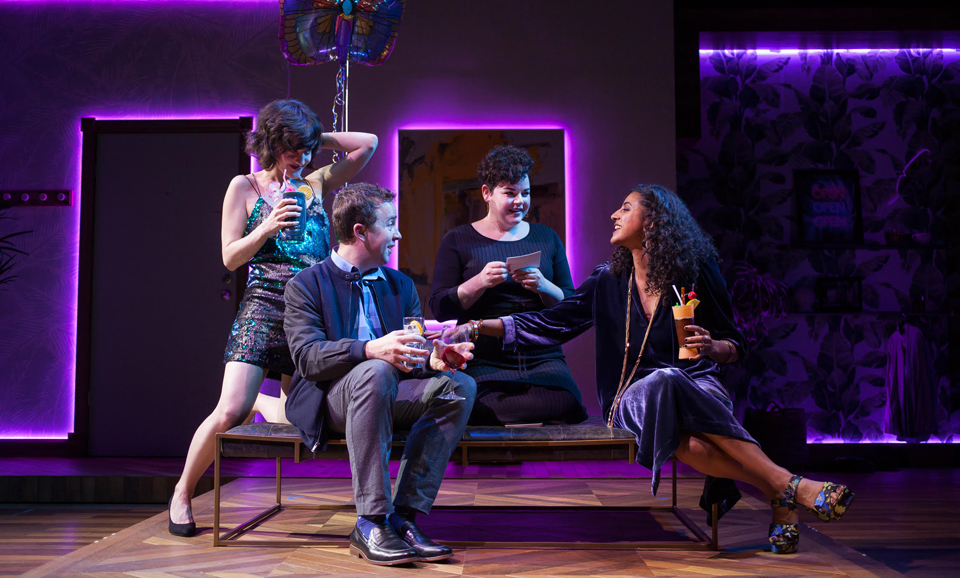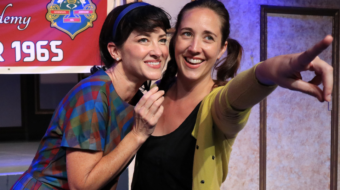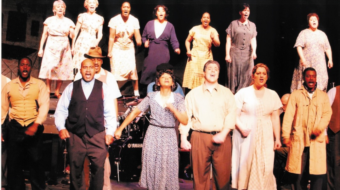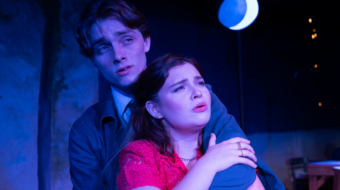
LOS ANGELES—Here’s a snarky joke: What three kinds of people go to the theatre?
“Gays, Jews…and gay Jews.”
Forget the ethnic and group stereotyping for a moment: At least in our major urban centers there is undeniably some truth to this tidbit of wit that writers and producers make considerable effort to cater to. Case in point:
Playwright Joshua Harmon’s Significant Other, billed as “a smash hit comedy” now at the Geffen Playhouse in West L.A., tells the tale of late-twenties Jordan Berman (Will Von Vogt), gay BFF with three of his female contemporaries, Kiki (Keilly McQuail), Vanessa (Vella Lovell) and Laura (Melanie Field), who one by one meet the loves of their lives and get married, leaving poor Jordan “always a groomsman, never the groom.” His BFF status with each of them in succession inevitably receives a downgrade.
Significant Other premiered Off Broadway in 2015 and made it to Broadway’s Booth Theatre for a run of 79 performances from February 14, 2017 (commonly known as Valentine’s Day but named “Singles Awareness Day” for purposes of audience development) through April 2017.
Incidentally, an earlier Harmon play, Bad Jews, is also opening shortly in L.A., which I will see on April 21.
Now as long as I’m on this slightly politically incorrect jag, let me go on to say that in some ways S. O. reverses the familiar trope of the “fag hag,” the woman who surrounds herself with gay friends for any number of speculative reasons: She enjoys their non-threatening company, sense of humor and interest in culture, she gets vicarious fulfillment hearing about their love lives, and she’s perhaps unwilling to test her own attractiveness to straight men, who might reject her. Being around gay men provides her a comfy comfort zone.
Hitting the perfect trifecta of the modern urban playgoer as I do, nevertheless gay Jewish gay Jew Jordan Berman did not seem to me to represent, as apparently he has to some others, the elevation of the gay character—commonly relegated to the sidekick wise-cracking wingman to straight characters—to center stage. That is actually more a characteristic of television than theatre, where plays featuring gay leading characters have been staged consistently since the late 1960s.
Quite to the contrary, Jordan seems like a throwback to an earlier time when gays and lesbians in fiction, on film and on stage were culturally required to be neurotic, self-hating and self-destructive, obsessive and possibly suicidal. After a while I found Jordan’s fears and anxieties over dating, or even casual sex, not to mention lasting emotional relationships with other men, not even amusing anymore but pathetic and worrisome. He seems never to have outgrown his adolescence. He makes a single reference to seeing a therapist, but only in the context of tossing off a one-liner about the doc’s recommendation to double his dose of depression meds. Personally, I’d recommend he switch therapists.
Jordan actually does have a “significant other”—his grandmother Helene Berman (Concetta Tomei)—whom Jordan checks in with frequently. That underwritten role offers little more than a security blanket for Jordan as he struggles unproductively with crippling self-esteem issues. Grandma reassures him that life is a long book and he’s only in one particularly rough chapter now; but how the audience is supposed to presume that brighter chapters lie ahead is anyone’s guess. And she’s not that grandmotherly wise either: “Don’t die young,” she advises her grandson, “but don’t get old.” “You just have to find your bashert” (the one destined for you), she says unhelpfully. She “kiddingly” talks of overdosing on pills.
Minor, though important roles of the men in the four friends’ lives are played by Preston Martin (Zach, Evan, Roger) and John Garet Stoker (Will, Conrad, Tony). Roger, Conrad and Tony are the husbands. Evan is an obnoxious queen and Will is distant and uncommunicative; Zach, the most promising possibility, isn’t over his last boyfriend. Alongside Jordan, these are the models of gayness that we see.
The acting is thoroughly superb, the three girlfriends successfully manifesting degrees of zaniness, depressiveness, and lack of self-confidence by which Harmon differentiates them. Jordan, is course, the star of the show. To Harmon’s credit, the playwright exteriorizes the exquisite internal fantasies and fetishes that make amorous obsession fascinating, and that we don’t often see on the stage, and therein lies a deep source of humor at Jordan’s expense.
We know, of course, that there really are lonely gay men who live such vivid if unsatisfying internal lives. In keeping with the “Singles Awareness Day” theme, however, I would only point out that singledom is a widespread phenomenon in America today. Some singles are perfectly content in their unattached state, while many others, like Jordan, wish they could find their bashert.
In 2014, the Bureau of Labor Statistics reported that 124.6 million Americans above the age of 16 were single (50.2 percent of that population), compared with 37.4 percent in 1976. Single people live in 59.8 million discreet households, which comprised 47.6 percent of households nationwide.
Such numbers translate into a lot of housing—apartment complexes, suburban tracts and high-rise living—and the appliances and furnishings that fill them. Typically for Americans, we impose an outsized individual footprint on the world with our conspicuously single consumption patterns. Singles now outnumber married adults in the U.S.
According to the Christian Science Monitor, “Almost half of new births are to unmarried mothers. The number of parents living together but not married has tripled. And the number of American adults who have never been married is at a historic high, around 20 percent.”
At the same time, mechanisms for finding mates have never been more extravagantly available. Yet the ubiquity of faces and profiles on a proliferation of websites and apps tantalizingly holds out the eternal possibility that the perfect Mr. or Ms. Right will surface with the next click of the mouse. An elaborate system of social customs has emerged that define the dating world, whether you’re looking for a hookup just x feet away or for an eventual walk down the aisle toward happily ever after. If the bashert never materializes, many women who want children will simply have them alone.
Significant Other doesn’t set its story within this larger social context. Indeed, there’s hardly a context at all, except that we know Jordan works at some large company with many employees. Other than his grandma, we don’t even know if he has siblings or parents. He doesn’t date, he turns down the one offer of sex he receives, he has no hobbies or interests that would bring him into contact with available gay men. He doesn’t join a social club or therapy group, or patronize gay venues such as a gym, bars, spas, retreats, ocean cruises, the gay men’s chorus, or even the LGBTQ synagogue, where, as the saying goes, “God helps those who help themselves.”
Yes, I laughed at his silly compulsive inanities along with the rest of the audience, but increasingly I found it hard to empathize with Jordan. Will Von Vogt is, though, magnificent in his portrayal, showing a frighteningly rich emotional range.
The stage design by Sibyl Wickersheimer is a marvel of ingenuity, with sliding panels opening to create a variety of settings. Costuming by Bobby Frederick Tilley is perfect. Stephen Brackett directed the proceedings. I did not in the end care much for the play, but he did a fine job.
I didn’t demand, nor did I expect an exuberant ending. But if there is hope for Jordan, it is extremely faint. I suppose if he’s desperate enough for a future subject, Harmon can always write a more upbeat sequel. I needed more contextual significance for this character.










